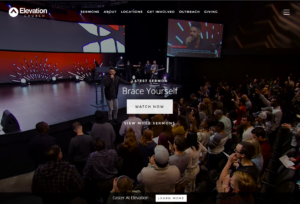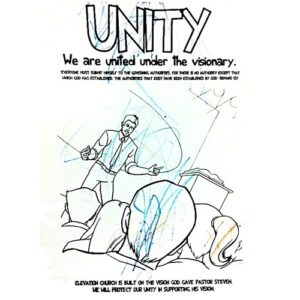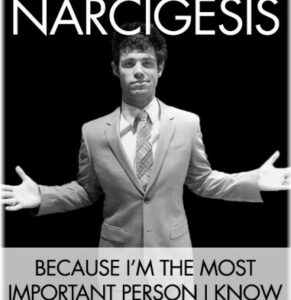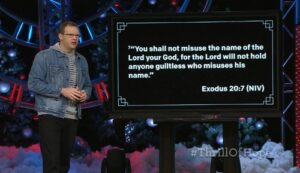“I am the entertainer, the idol of my age; I make all kind of money, when I go on the stage.” Billy Joel, The Entertainer
There is emerging and has emerged a new breed of pastor pushing a new brand of church. Though these emerging men call themselves pastors, they are anything but shepherds. Though they call their organizations churches, they are anything but a set apart body of believers. These “pastors” are effectively entertainers who put on a show for their audiences. Their business transactions, because of their overt religious nature, are tax free. “Tithes and offerings” serve as a substitute for ticket sales. These entertainers do not preach from a pulpit; rather, they perform from a stage. However, unlike most entertainers, they do not tour. Instead of traveling from town-to-town, they set up shop in permanent places and play to the same hungry crowd over and over. Unfortunately, the hunger of their crowd is never truly satisfied. Yet the crowd returns week after week in order to take part in counterfeit worship, with a counterfeit church, lead by counterfeit pastors. The Entertainers are able to perpetuate their unholy model of church by preying on the desires of the unchurched; desires for relationship, ownership, and leadership. The Entertainers provide all of this, but not in a biblical manner. Building charismatic cults of personality, the Entertainers, set themselves up as the pinnacles of authority, interpreting and applying the bible through the narcigetical lens of their own self-important lives. The religious and political climate of the United States provides a perfect business environment for The Entertainers to hang up their shingles. Young people, in large numbers, who were raised in church have been disaffected by what they see as “traditional” church models. They want to go to church but not the church of their parents. These young people yearn for what The Entertainers provide at “churches” such as NewSpring, Elevation, and Venue. American religious freedom ensures that no government or ecclesiastical authority can shut down those who preach heresy. Thus, unqualified “pastors” like Steven Furtick, Perry Noble, and Tavner Smith operate with impunity, and tax-exemption, alongside those men who do pastor biblical churches. By studying the tendencies and strategies of The Entertainers, true Christians can learn to lead their unchurched friends away from the cult-like influence of these charlatans and towards the biblical gospel.
Relationship
“The friendship which draws human beings together in a tender bond is sweet to us because out of many minds it forges a unity.” Augustine
Before any human being was ever created there existed a self, God. God is one being, consisting of three persons. So then, before any human person was created, there existed relationships; if only between the three members of the Trinity. Upon the creation of man, new relationships were formed. This is because mankind was created in God’s own image. Because God is a spiritual being, the image of man must not be understood purely anthropomorphically. Man’s image does not consist of his legs, arms, and other physical features. Man’s image consists of his personhood, of his self. Understanding this biblical truth is not only essential to theology, it essential to understanding human psychology and human relations. This is because each man is a person (or self) designed to engage in relationships; with God, with others, and with himself.[1] It’s no surprise, then, that people seek to participate in communities with others, especially with like-minded people. Church can fulfill someone’s longing to belong; however, the desire to participate in community is not limited to religious people. Even atheists get together for Sunday assemblies. In other words, sound biblical doctrine and Christian accountability is not required to foster community. The Entertainers know this. They seek to draw people in by creating and controlling community that revolves around their “church” organization.
Creating “life groups” is a popular new tool for doing this. At many churches life groups are just old-fashioned Sunday school classes by another name. However, at entertainment churches Life Groups can also revolve around extra biblical interests, such as sewing or hiking. Members of Life Groups meet each week, not just on Sunday morning, to “do life together.” Soon, the members of these life groups find each other at each other’s life events; from weddings to birthday parties to Saturday afternoon football watching sessions and everything in between. Church becomes life. Leaving church, upon the realization that the doctrine being preached by the entertainer is unbiblical and “worship” services are nothing more than bread and circuses, becomes leaving that life. Because Life Groups infiltrate and involve one’s life-encompassing interests, leaving the Life Group involves leaving one’s total community. Anyone can find a new preacher to listen to on Sunday; there are hundreds of preachers in any geographical area. Finding a new sewing group is not so easy. To make matters worse, Life Groups essentially revolve around admiration for the charismatic leader of the church (Think of Seinfeld – George, Elaine, and Kramer wouldn’t have been friends if not for knowing Jerry). It is in the Life Groups that the entertainer’s teachings are studied and affirmed. Failing to affirm the teachings of the entertainer is a failure to maintain one’s essential, every-day community relationships.
Ownership
“The things that you own end up owning you.” Chuck Palahniuk, Fight Club
Historically local church bodies have been composed of “members.” While there is no specific prescription in scripture for churches to maintain membership rolls, the necessity and justification for doing so is commonsensical. According to the Baptist Faith and Message 2000, “A New Testament church of the Lord Jesus Christ is an autonomous local congregation of baptized believers, associated by covenant in the faith and fellowship of the gospel… Each congregation operates under the Lordship of Christ through democratic processes… Its scriptural officers are pastors and deacons.” The governance of the local church is vested in its congregation, thus there must be some way of specifically identifying congregants. Membership rolls are the way local churches achieve and manage this identification. There are literally millions of people who claim to be Christians, members of the church catholic, the universal body of Christ. However, only the members of a local church have any say in their own local church’s governance. Furthermore, only His local church has any say in the church discipline of an individual Christian. Church membership identifies the authoritative relationships between individuals and local churches.
Because of the politics and power games that are inherent to any organization governed by sinful humans, some churches are beginning to eschew membership altogether. This removes a degree of formality from church affairs. This formality, and the power structure that underlies it, has been off-putting to many church attendees and has effectively soured them on church affairs altogether. Yet, these people still yearn for community. Knowing this, some entertainers have rebranded church “membership” as church “ownership.” This is the case with Perry Noble’s NewSpring Church, which boasted average attendance of 31,215 in 2015. According to NewSpring’s website, “Members have rights, Owners have responsibilities.” Statements such as this are exactly how The Entertainers prey upon the felt needs of their marks. “Those other churches, the ones that hurt me in the past, have members,” think the marks, “at my new church, I am an owner. I’m a part of it.” A sense of community is tied to a sense of ownership. This mixing creates another layer of insurance against those who would wish to leave entertainer church. They not only leave their community, they leave their responsibility.
Multi-site Megachurch marketing machines like NewSpring require much labor to operate; they employ innumerable workers such as parking lot attendants, hospitality team members, and childcare providers. Paying for this labor would be a crippling burden on the church’s finances. According to its own annual report, NewSpring utilized 5,591 weekly volunteers in 2014. Thus, thousands of “owners” provided free labor which did not draw upon the churches $59,340,144 in annual income, $20,175,648 of which was used to compensate paid staff members. The salary of Perry Noble is not set by the “owners” of NewSpring (those with responsibilities, not rights) but rather is set by a special board tasked with doing so. So, in effect, “owners” are expected to provide free labor while having little to know say as to the compensation level of the man who effectively serves as their company’s CEO, Perry Noble. This hardly sounds like true ownership.
The “ownership” mindset employed by the Entertainers is not much different than the one employed by multilevel marketing organizations such as Amway. Organizations like Amway entice people into participation with the lure of ownership. Whether the product being sold is Amway, Rodan and Fields, or Young Life Essential Oils, multilevel marketing organizations offer participants the chance to “own their own business” rather than just work for someone else. These business owners, however, are essentially customers of the marketing organization. They, then, attempt to draw their friends and families into the organization by virtue of their personal connections and testimonies. Former Amway distributor Stephen Kosar described the climate of such an organization as follows:
“…the best speakers in the Amway business weren’t the ‘professional’ speakers, they were the ‘regular folks’ who worked hard and had made it to the level of Diamond (or higher). These ‘regular folks’ would convince the socks off of anyone that you could make it happen! ‘You just need to buy into the system and do everything your leaders tell you to do-your success is guaranteed! If you’re dream is big enough, the facts don’t count!’…On top of the very convincing speakers, they had amazing videos with powerful music and emotionally charged stories to tear at your heartstrings. The use of multimedia was incredibly effective-especially in a stadium full of like-minded people who all believed. We were even told that if you went to the next big meeting it ‘would really build up your belief.’ A more honest way of saying it would be ‘if you go to this big meeting you’ll be convinced to stick around long enough for us to make money off of you for a little while longer, because you’ll be emotionally convinced that this business is great!’”
The Entertainers structure their church meetings like Amway conventions. Music and multimedia is relied upon heavily to create an engaging experience. For example, Elevation Church even employs a “Creative Pastor” to help program “the weekend worship experience.” “Creative Pastor” is merely a religious sounding term for a sound and lighting engineer. Pastors have long been employed by churches, but a “creative pastor” would have been unheard of in biblical times. A stage hand, however, would not have been. Stagecraft is an ancient art, one that has been employed by entertainers for years. Stagecraft is being used to sell “ownership” to the potential customers of entertainment church. These customers don’t buy consumer goods such as cosmetics and oil, but rather pay tithes and offerings as part of their ownership responsibilities. These “owners,” though far from the top rung of their organizations, are as emotionally sold out as the most dedicated Amway distributor.
As Kosar makes clear, stagecraft is not the most compelling factor in drawing in others. Personal testimony is. Entertainment churches employ personal testimonies heavily. In a 28-minute testimony video titled “Won by One” and distributed by Venue Church, three “owners” give their personal testimony, not about repentance and sanctification, but about being involved with Venue Church. These testimonies are clearly designed for people who have been raised in church culture and already have ideas of what church is like. Venue Church is presented as different, if not better. The gospel is not substantively presented in any testimony. What is presented, amidst a background of emotional music (including Paraside by ColdPlay), is “owners” at Venue Church telling about how great their church and their pastor, Tavner Smith, are. One man, Drew Taylor, speaks of his upcoming marriage to his girlfriend, Whitney. The context of the video implies that Drew and Whitney have been living in sin and yet have still been allowed to participate in various ministries at Venue Church. Church discipline and the gospel seem to be an afterthought at Venue. What are at the forefront are the various Life Groups in which Venue owners can participate.
On several occasions during New Testament times, the Apostle Paul wrote to the Church at Corinth. This particular church was stepped in immorality and had failed to exercise church discipline over members in sin. Paul was very clear about the importance of Holy living to the Corinthians, telling them, “you are not your own, for you have been bought with a price”. The body of Christ, the bride of Christ, belongs to Jesus. Christians were redeemed, purchased, by the shed blood of Jesus Christ. There is but one owner in any local body of believers, it is Jesus. The rest are members, members of the body of Christ. Entertainment churches pervert the nature of the body of Christ, replacing “members” with undisciplined, self-determining “owners.” For this, there is no biblical justification. The reason for creating “owners” is apparent to those studied in psychology and marketing. Creating owners creates a consistency trap. In order for one to repudiate and leave the church, one would need to go back on his personal testimonies to friends and family about why the church was a good organization. One would need to admit that as an “owner,” he was partly responsible for the dysfunction. Using a consistency trap, The Entertainer uses the effect of cognitive dissonance to cause the “owners” of his church to think and behave in ways that justify their poor decision to join his entertainment church; in other words, he sets them up to fail while setting himself up to win.
Leadership
“Well, it may be the devil or it may be the Lord, but you’re gonna have to serve somebody.” Bob Dylan, Gotta Serve Somebody

While relationship and ownership are important pieces of the pie, the essential part of an entertainment church is its leadership. Organizations and movement always require leaders, especially since many people are natural followers. Churches, especially counterfeit ones, are no different. At his organization, the leadership of The Entertainer, along with his charisma and general swagger, draws and keeps the crowd coming. The Entertainer is essentially the golden goose of his church. Because of his importance as the draw, he must essentially preach himself rather than Christ. This opens the door to a wealth of cult-like heresies. For example, Tavner Smith has proclaimed from his pulpit that, “God doesn’t have legal authority to operate in the Earth without a body; He needs men to accomplish His work.” Perry Noble once famously claimed that Jesus told him to preach a sermon in which he proclaimed that the Ten Commandments were not actually commandments. Perhaps the worst example of a cult-like entertainer is Steven Furtick. At his church, Elevation, children were given a picture of him to color which was captioned, “We are united under the visionary…we will protect our unity in supporting his vision.” The cardinal sin to an entertainment church is not blaspheming God (that could be done from the stage every Sunday without much objection), but defaming The Entertainer. Since the Entertainer functions as a CEO who lords himself over innumerable associate pastors, he is insulated from interacting with individual congregants. Furthermore, any associate pastor who comes to his senses can be quickly fired by his boss, The Entertainer, for challenging his unbiblical practices. Accountability for The Entertainer, as he grows richer and richer off of the tax-free business he has built, is little.

Because accountability is counter-intuitive to their model, entertainment churches will almost always be nondenominational or a nominal part of a congregational denomination. NewSpring Church, for example, is a Southern Baptist Church. However, its association with the convention is minimal (and the denominator “Baptist” is notably absent from the church’s name). The public rebuke of a member church from Baptist denominational leadership is rare. Yet, Perry Noble drew just that from the President of the South Carolina Baptist Convention for his heretical treatment of the Ten Commandments. The bad publicity Noble received precipitated an apology from him. However, despite being exposed as clearly unqualified to teach from God’s word, Noble (a seminary dropout) remains the head of NewSpring Church. It’s hard to derail the charisma train. His church is all about The Entertainer. There is no show without him. At the Venue Church website, the “bio” page describes not the history of the church but the personal story of Pastor Tavner Smith and his wife, Danielle. The brand that is being sold to potential attendees of entertainment churches includes the story and style of The Entertainer himself. It’s not unusual for a website to revolve around the antics of The Entertainer.
The expansion of the brand involved the expansion of The Entertainer. Rather than planting new churches, The Entertainer starts new campuses where his sermons are piped in over the internet. Essentially his church becomes its down denomination, if not its own religion. The reputation of The Entertainer will be protected at all costs. This will often involve preaching against other churches that are “judgmental” in some unacceptable way or relishing in the objections from concerned Christians opponents, labeling such people “haters.” His church members or “owners” as the case may be, are as ready to defend their charismatic pastor as they are Christ. It’s a matter of being too cool for school, and congregants eat it up. Tavner Smith, for example, “wears jeans when he preaches and frosts his hair.” Nontraditional styling is also an important part of the way Furtick and Noble present themselves. Unfortunately, it’s a matter of putting lipstick on a pig.
Insidious Orthodoxy and Practical Matters
Like Mormon missionaries at the front door, the website of The Entertainer’s church will rarely indicate an overt theological problem. Statements from such churches will almost always affirm the authority of scripture, the existence of Heaven and Hell, and the trinity of God. Thus, concerned friends and relatives of church goers will find nothing apparent as they investigate the church. A drive-by of the church’s website is oftentimes not sufficient to expose the inherent problems of the church. Orthodox Christians watch in dismay as entertainment churches grow at rapid paces. Faithful Christians must be ready to witness to the attendees of these churches as they are likely lost or yet to come to the realization that their church is a fraud and their pastor is a charlatan. Faithful Christians must also remember not to be discouraged by the rapid growth of these “churches.” They are essentially businesses that have no intentions of operating like biblical churches. The true church of God will remain. Since the harvest is plentiful and the workers of few, faithful Christians should be ready to approach the attendees of entertainment churches for witnessing encounters. There is probably little chance of putting entire organization out of business, yet individuals can be reached and freed in small numbers.
As for the entertainers themselves, there is a righteous Judge in Heaven whose ears are far less ticklish than the fickle, fleshly, sinful men that walk this Earth looking for someone to tell them what they want to hear.
“It is a terrifying thing to fall into the hands of the living God.” Hebrews 10:31
[Contributed by Seth Dunn, host of The Christian Commute]
*Please note that the preceding is my personal opinion. It is not necessarily the opinion of any entity by which I am employed, any church at which I am a member, any church which I attend, or the educational institution at which I am enrolled. Any copyrighted material displayed or referenced is done under the doctrine of fair use.
[1] Jones, I. F. (2006). The Counsel of Heaven on Earth. Nashville, TN: Broadman and Holman, p.33














